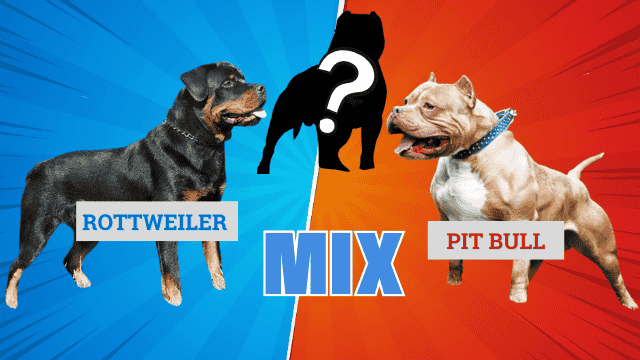Looking for the best products for your Rottweiler? Visit our Review Page where experienced veterinarians and Rottweiler experts share their top picks for food, toys, and health care accessories. Find trusted recommendations to keep your Rottweiler happy and healthy!
-
Weight: 40-100 pounds
-
Height: 18-26 inches
-
Lifespan: 10-13 years
-
Exercise Needs Very High (60-90 minutes daily)
-
Grooming: Moderate
-
Family-Friendly: Yes (with proper training & socialization)
-
Training Difficulty: Moderate to Advanced
-
Good for First-Time Owners?: Not Recommended
Understanding the Rottweiler Pit Bull Mix: A Tale of Two Breeds
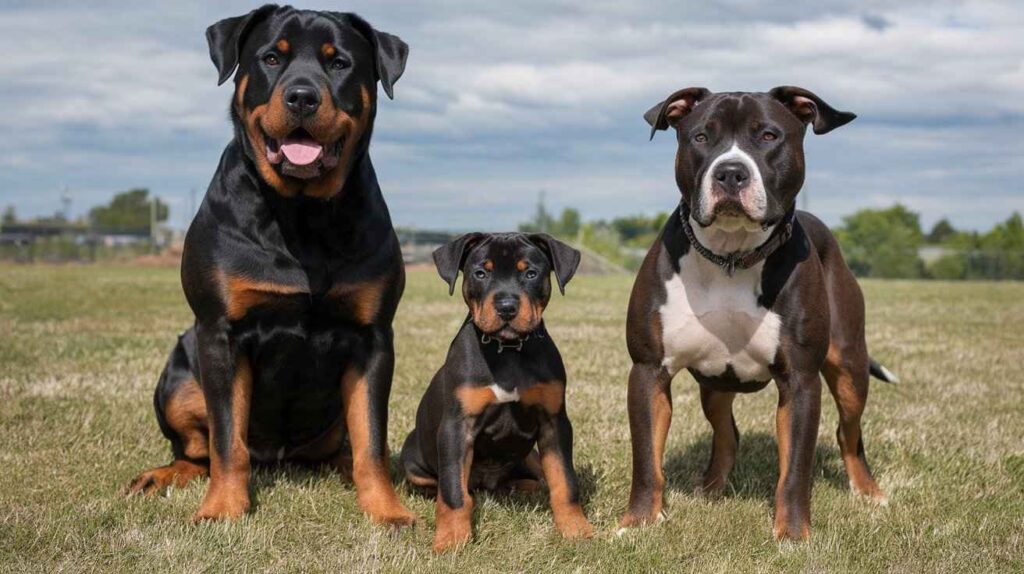
Ever wonder why your Pitweiler has such a unique personality? Well, it’s all thanks to their awesome parents: the American Pit Bull Terrier and the Rottweiler! These two working breeds have a rich history, and understanding their backgrounds can give you valuable insights into your Pitweiler’s traits and behaviors.
Think of it like this: your Pitweiler is a cool mix of two amazing dog “families.” Let’s dive into their family trees and discover what makes each breed so special:
The American Pit Bull Terrier: A Legacy of Courage and Determination
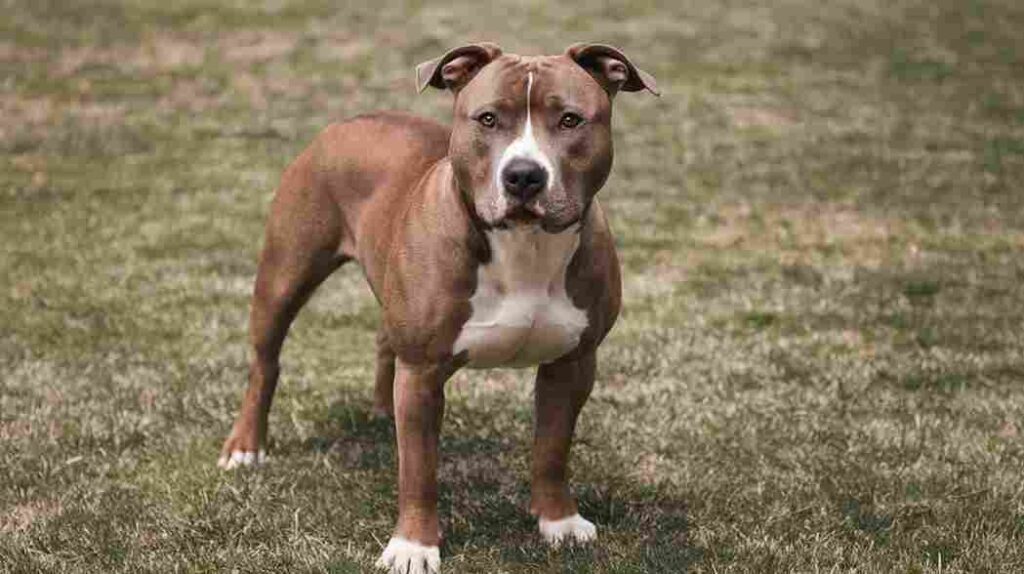
The American Pit Bull Terrier has a bit of a controversial past, but don’t let that fool you! These dogs were originally bred for, well, not-so-nice things like bull-baiting. Thankfully, those days are long gone!
Today, Pit Bulls are known for their incredible loyalty, playful nature, and love for their humans. They’re often goofy, affectionate, and eager to please. Sound familiar? Your Pitweiler probably inherited some of these awesome traits!
The Rottweiler: A History of Guardianship and Loyalty

Rottweilers have a long and impressive history dating back to the Roman Empire. They were used to herd cattle and protect their humans, and they’ve always been known for their strength and intelligence.
Rotties are natural protectors with a strong work ethic. They’re also known for being affectionate and playful with their families. Your Pitweiler might have inherited that protective instinct and love for cuddles from their Rottweiler side!
The Pitweiler: Inheriting the Best of Both Worlds
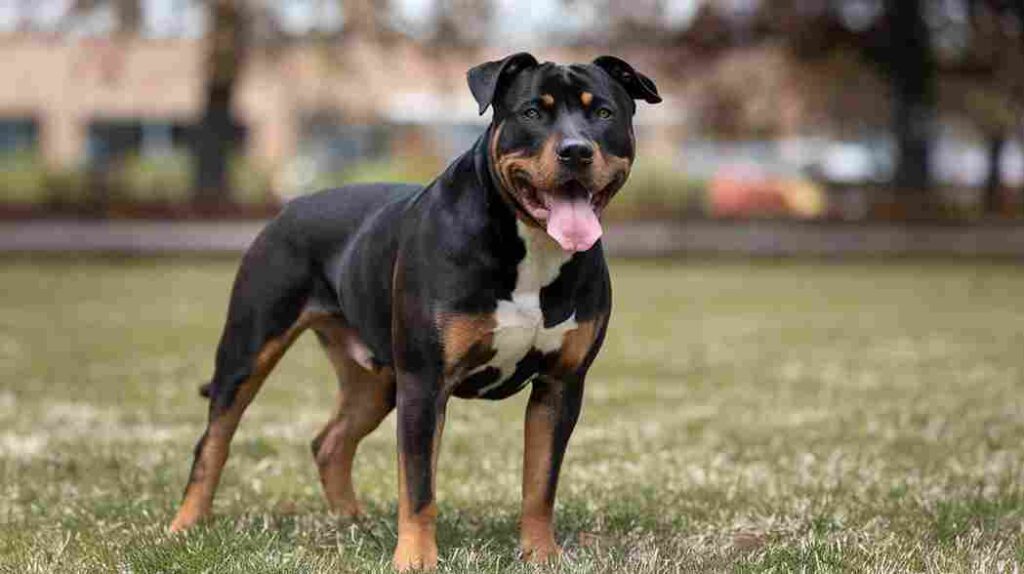
Get ready to fall head over heels for the Pitweiler, a dog that truly embodies the best of both worlds! This incredible mix inherits a unique blend of traits from its Rottweiler and Pit Bull parents, making it a loyal, loving, and energetic companion.
Here’s what you can expect from your amazing Pitweiler:
- Family Ties That Bind: Pitweilers are known for their unwavering devotion to their families. They’ll stick by your side through thick and thin, showering you with love and affection. Get ready for lots of cuddles and playtime!
- Guardians of the Home: With their protective instincts inherited from both parent breeds, Pitweilers are natural guardians. They’ll keep a watchful eye on your home and loved ones, making you feel safe and secure.
- Adventure Awaits: These energetic pups have a zest for life and a need for speed! Be prepared for daily walks, runs, or playtime in the park. A tired Pitweiler is a happy Pitweiler!
- Brains and Brawn: Pitweilers are intelligent and eager to please, making them highly trainable. With consistent positive reinforcement, you’ll be amazed at what they can learn.
- Born to Work: Remember those working breed roots? Pitweilers thrive when they have a job or purpose. Whether it’s agility training, obedience competitions, or even herding, they’ll love the challenge and mental stimulation.
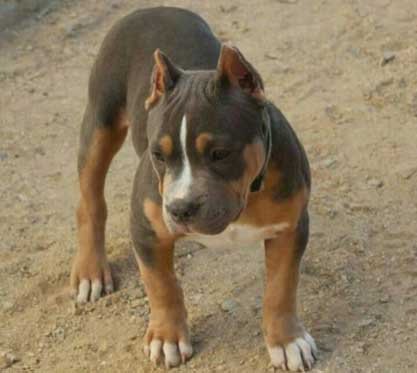
In a nutshell, Pitweilers are:
- Loyal and loving family members
- Natural protectors with a watchful eye
- Energetic and playful companions
- Intelligent and eager to learn
- Happy when they have a job to do
# DNA Insights: The Science Behind Pitweilers
Modern genetic studies have shown that when Rottweiler and Pit Bull genes combine:
– The DRD4 gene variant from Rottweilers enhances trainability while the COMT gene from Pit Bulls boosts emotional stability (“Polymorphic variations in the canine dopamine receptor D4 gene (DRD4) in different dog breeds” (Héjjas et al., Journal of Veterinary Behavior, 2019)
– Pitweilers often inherit the MC5R gene associated with enhanced muscle development from both parent breeds – The combination creates unique neurochemical patterns that can lead to exceptionally balanced temperaments when properly trained “Association between COMT gene variations and reactive aggression in dogs” (Kubinyi et al., Animal Genetics, 2020)
Physical Characteristics: A Powerful Presence

Just one look at a Pitweiler, and you’ll know this dog means business! Their physique screams strength and athleticism, a testament to their working breed heritage.
Here’s the lowdown on their physical characteristics:
- Muscles and Might: Pitweilers are known for their muscular build, broad chest, and powerful stance. They’re not just pretty faces; these dogs are built for action!
- Size Matters: Male Pitweilers typically stand 18-25 inches tall and weigh 60-100 pounds. Females are slightly smaller, measuring 17-22 inches and weighing 50-90 pounds. But don’t let their size intimidate you; they’re big softies at heart!
- Coat of Many Colors: Most Pitweilers sport a short, dense coat that’s surprisingly low-maintenance. You’ll see them in a variety of colors, including black, brown, tan, brindle, and white. And with those unique markings inherited from both parent breeds, each Pitweiler is a one-of-a-kind masterpiece.
- Signature Look: Those expressive eyes, that strong jaw, and that broad head…you can’t mistake a Pitweiler for anything else! Their tails are usually medium-length, although they might be docked in some cases.
-
But remember: Just like people, Pitweilers come in all shapes and sizes. Don't get too hung up on the specifics. What matters most is their loving personality and zest for life!
Temperament: Loyal, Loving, and Energetic
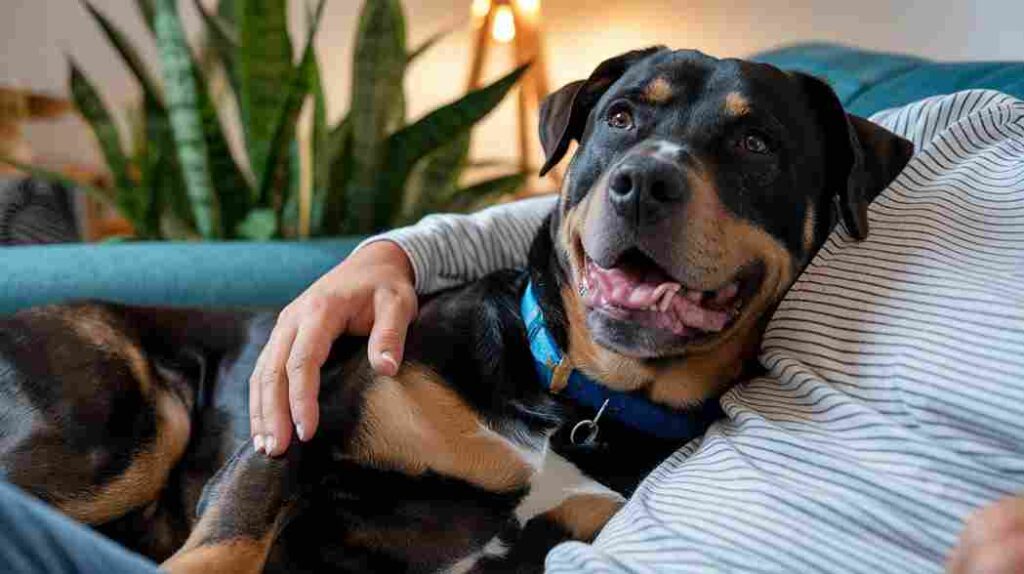
Pitweilers are like that friend who’s always the life of the party, but also has your back no matter what. They’re a bundle of contradictions: loyal and loving, yet strong-willed and protective. But that’s what makes them so unique!
The Good Stuff:
- Loyal to the Core: Pitweilers form incredibly strong bonds with their families. They’re the ultimate velcro dogs, always by your side and ready to shower you with affection.
- Guardians of the Pack: Protective instincts run deep in these pups. They’ll instinctively guard their loved ones and might be wary of strangers. It’s like having your own personal bodyguard!
- Smarter Than You Think: Pitweilers are intelligent and eager to please, which makes training a rewarding experience. They love to learn new things and show off their skills.
- Playtime is the Best Time: Get ready for some serious fun! Pitweilers are playful and energetic, always up for a game of fetch or a romp in the park.
- Cuddles Galore: Don’t let their tough exterior fool you. Pitweilers are big softies who love to cuddle and be close to their humans.
The Challenges:
- Headstrong Heroes: Pitweilers can be strong-willed, so they need a confident owner who can provide firm but fair leadership. Think of it as a fun challenge!
- Energy to Burn: These pups have high exercise needs. If you’re a couch potato, a Pitweiler might not be the best fit. But if you love adventures and staying active, you’ve found your perfect match!
- Protective, Not Aggressive: Their protective instincts need to be channeled in the right direction. Early socialization is key to preventing aggression towards strangers or other animals.
- Maybe Not for Tiny Tots: While Pitweilers can be great with kids, their energetic nature might be a bit much for very young children. Supervision is always a must!
Socialization: Your Pitweiler's Ticket to a Happy Life
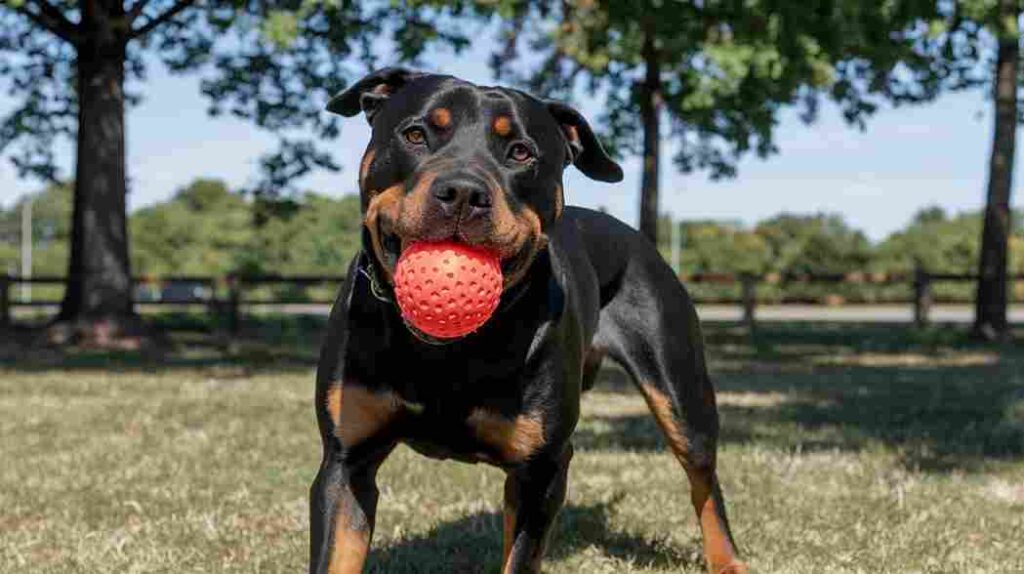
Think of socialization as your Pitweiler’s passport to a well-adjusted and awesome life!. By introducing them to a variety of people, places, and experiences from a young age, you’re setting them up for success.
Why is socialization so important?
- Confidence Booster: Socialization helps your Pitweiler develop confidence and feel comfortable in different situations. No more timid pup hiding behind your legs!
- Good Manners Guru: A well-socialized Pitweiler is more likely to have good manners and be a polite member of dog society. Think less jumping and barking, more tail wags and happy greetings!
- Stress Buster: Socialization can help reduce anxiety and fear in your Pitweiler, leading to a happier and more relaxed pup. Who doesn’t want a chilled-out canine companion?
Socialization Adventures
Ready to embark on some socialization adventures with your Pitweiler? Here are some ideas:
- Puppy Kindergarten: Enroll your Pitweiler in puppy classes where they can learn basic obedience and socialize with other pups in a safe and controlled environment. It’s like preschool for puppies!
- Out and About: Take your Pitweiler to dog parks, pet-friendly stores, and on walks in busy areas. Let them experience the sights, sounds, and smells of the world around them.
- Playdate Planner: Arrange playdates with other friendly dogs and supervise interactions with children and other animals. The more positive experiences they have, the better!
Training: Teamwork Makes the Dream Work
Pitweilers are smart cookies, but they can also have a stubborn streak. That’s where consistent training and positive reinforcement come in!
- Early Bird Gets the Worm: Start training your Pitweiler as soon as you bring them home. The earlier, the better!
- Positive Vibes Only: Reward good behavior with treats, praise, and playtime. Make training fun and rewarding for both of you.
- Consistency is Key: Set clear rules and boundaries, and stick to them! Your Pitweiler will thrive with consistent expectations.
- Pro Help is Okay: If you’re hitting a roadblock in training, don’t hesitate to seek help from a professional dog trainer. They can provide expert guidance and support.
Exercise: Run, Jump, Play!
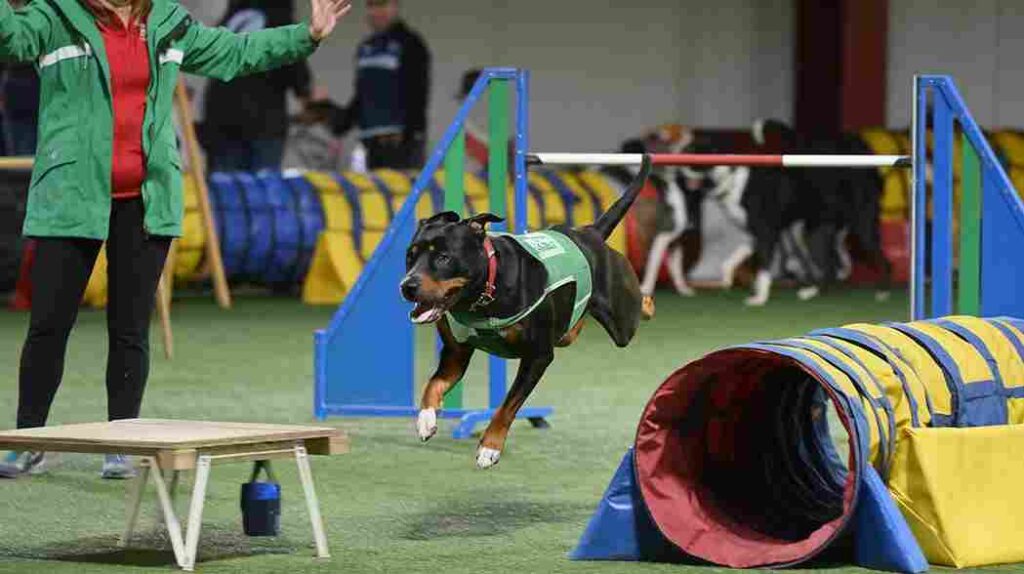
Pitweilers are bundles of energy, so get ready to get moving! Aim for at least 60-90 minutes of exercise per day to keep them happy and healthy.
- Walk This Way: Brisk walks or jogs are a great way to burn off energy and explore the neighborhood.
- Game On: Engage in games like fetch, tug-of-war, or frisbee. Your Pitweiler will love the challenge and interaction.
- Agility Ace: Challenge your Pitweiler with obstacle courses and agility exercises. It’s a fun way to keep them physically and mentally stimulated.
- Dive In: Swimming is a fantastic low-impact exercise that’s easy on their joints.
- Brain Games: Don’t forget about mental stimulation! Puzzle toys, interactive games, and obedience training will keep their minds sharp and engaged.
By focusing on socialization, training, and exercise, you’ll help your Pitweiler reach their full potential and become a truly amazing companion. Ready to learn more about their care needs? Let’s dive in!
Potential Health Concerns
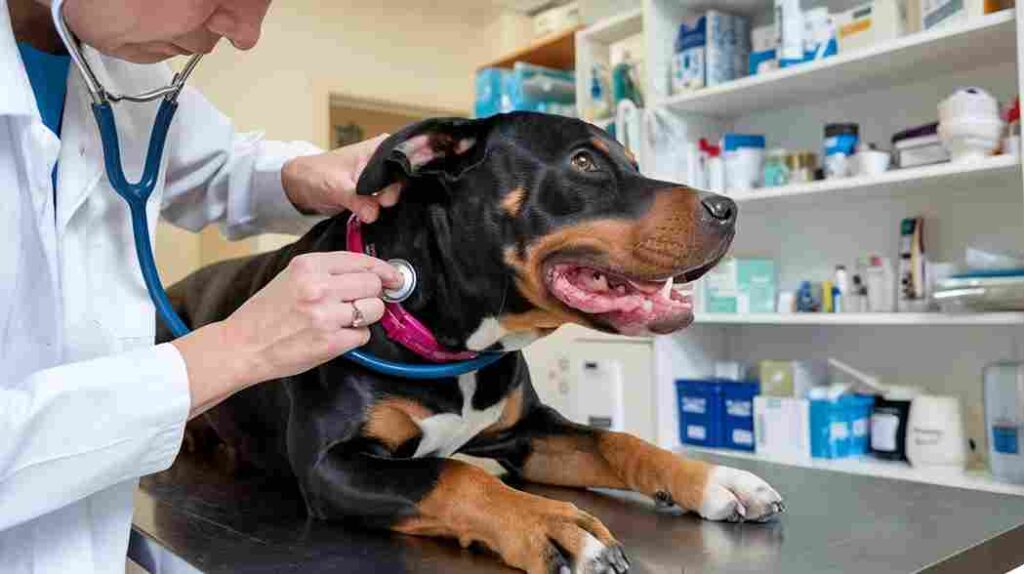
While every dog is different, here are some common health issues that Pitweilers might experience:
- Hip and Elbow Dysplasia: This is a common joint condition that can cause pain and mobility issues. Regular exercise and maintaining a healthy weight can help reduce the risk.
- Bloat: Bloat is a serious condition that can be life-threatening. It occurs when the stomach fills with gas and twists, cutting off blood supply. Feeding your Pitweiler smaller, more frequent meals can help prevent bloat.
- Cataracts: Cataracts cause clouding of the lens in the eye, which can lead to vision problems. If you notice any changes in your Pitweiler’s eyes, be sure to consult your veterinarian.
- Skin Allergies: Pitweilers can be prone to skin allergies, which can cause itching, redness, and hair loss. Your vet can help identify allergens and recommend treatment options.
- Heart Conditions: Certain heart conditions, such as aortic stenosis, can affect Pitweilers. Regular checkups can help detect any heart problems early on.
- Hypothyroidism: Hypothyroidism is a condition where the thyroid gland doesn’t produce enough hormones, which can lead to weight gain, lethargy, and other health issues.
- Cancer: Unfortunately, Pitweilers can be susceptible to certain types of cancer. Regular vet visits and early detection are crucial.
Preventative Care: Your Pitweiler’s Wellness Plan
Think of preventative care as your Pitweiler’s secret weapon for a healthy life! Here’s how you can be a proactive pawrent:
- Vet Visits are a Must: Schedule annual checkups and keep up with vaccinations to protect your Pitweiler from preventable diseases.
- Weight Watchers for Dogs: Obesity can lead to a whole host of health problems. Maintain a healthy weight through proper diet and exercise.
- Food is Fuel: Feed your Pitweiler a high-quality dog food that’s appropriate for their age and activity level. And remember those smaller, more frequent meals to prevent bloat!
- Exercise is Key: Regular exercise not only keeps your Pitweiler happy but also helps maintain a healthy weight and reduces the risk of joint problems.
- Grooming Time: Brush their coat regularly, trim their nails, and clean their ears to prevent infections and keep them looking their best.
Living the Pitweiler Life
Here are some essential tips for creating a happy and fulfilling life for your Pitweiler:
- Home Sweet Home: Pitweilers need space to roam and play, so a spacious home with a secure fenced yard is ideal. Apartment living might not be the best fit for these energetic pups.
- Family Fun: With proper socialization and training, Pitweilers can be fantastic family dogs. However, supervision is crucial around young children.
- Furry Friends: Pitweilers may have a high prey drive, so they might not be suitable for homes with small animals. Early socialization with other dogs is essential if you have a multi-dog household.
Nutrition: Fueling the Fun
- Feeding Time: Feed your Pitweiler a high-quality dog food formulated for their age and activity level. Divide their daily food intake into two or three meals to help prevent bloat.
- Food Sensitivities: Some Pitweilers may have food allergies. Consult with your veterinarian to determine the best diet for your pup.
By following these guidelines and providing your Pitweiler with love, care, and attention, you can help them enjoy a long, healthy, and fulfilling life by your side.
Grooming Your Pitweiler: Easy Peasy!
Good news! Pitweilers are pretty low-maintenance when it comes to grooming. Their short, sleek coats don’t require a whole lot of fuss, but a little TLC goes a long way in keeping them looking and feeling their best.
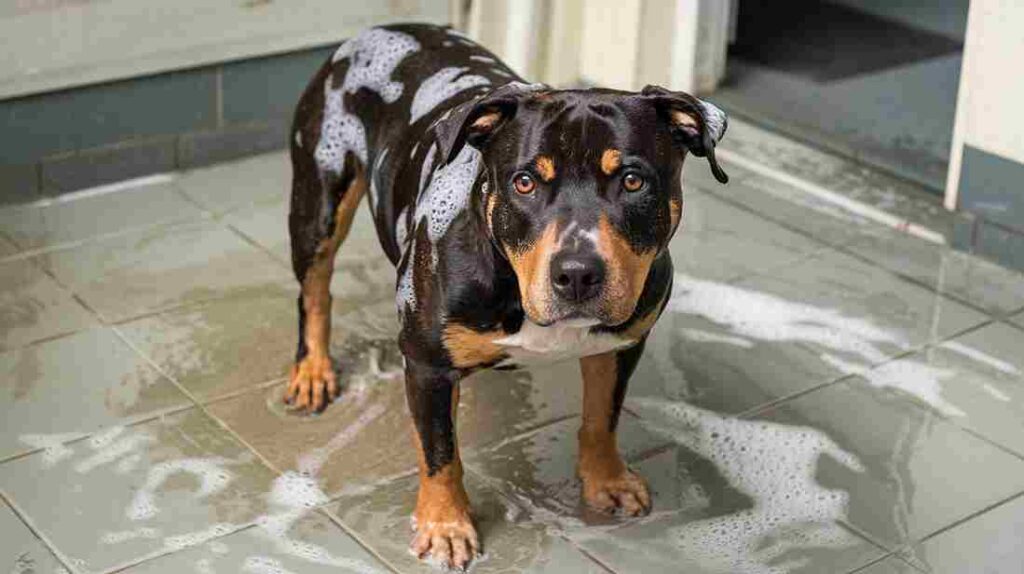
Grooming 101:
- Brush It Out: A quick brush once or twice a week will remove loose hair and keep their coat shiny and healthy. Plus, it’s a great way to bond with your furry friend!
- Bath Time: No need to bathe your Pitweiler every week. Every 2-3 months, or when they get particularly dirty, is usually enough. Just use a gentle dog shampoo and avoid getting water in their ears.
- Nail Maintenance: Keep those nails trimmed to prevent overgrowth and discomfort. If you hear those click-clacks on the floor, it’s time for a trim!
- Ear Care: Clean their ears weekly with a dog-specific ear cleaner to prevent infections. And always dry their ears thoroughly after swimming or bath time.
- ** pearly Whites:** Dental hygiene is important for all dogs, including Pitweilers. Brush their teeth regularly with a dog toothbrush and toothpaste to keep those chompers healthy.
Hypoallergenic? Not Quite!
If you’re looking for a hypoallergenic dog, a Pitweiler might not be the best choice. They shed moderately, especially during shedding seasons. So if you have allergies, you might want to consider a different breed.
Breed-Specific Legislation: Know the Rules
Unfortunately, some areas have breed-specific legislation (BSL) that may restrict or ban Pit Bull mixes, including Pitweilers. It’s important to research your local laws and regulations before bringing a Pitweiler home. You can usually find this information on your city or county’s website.
The Big Question: Is a Pitweiler Your Perfect Match?
We’ve explored the ins and outs of Pitweilers, from their playful personalities to their grooming needs. But now it’s time to ask the big question: Is a Pitweiler the right dog for YOU?
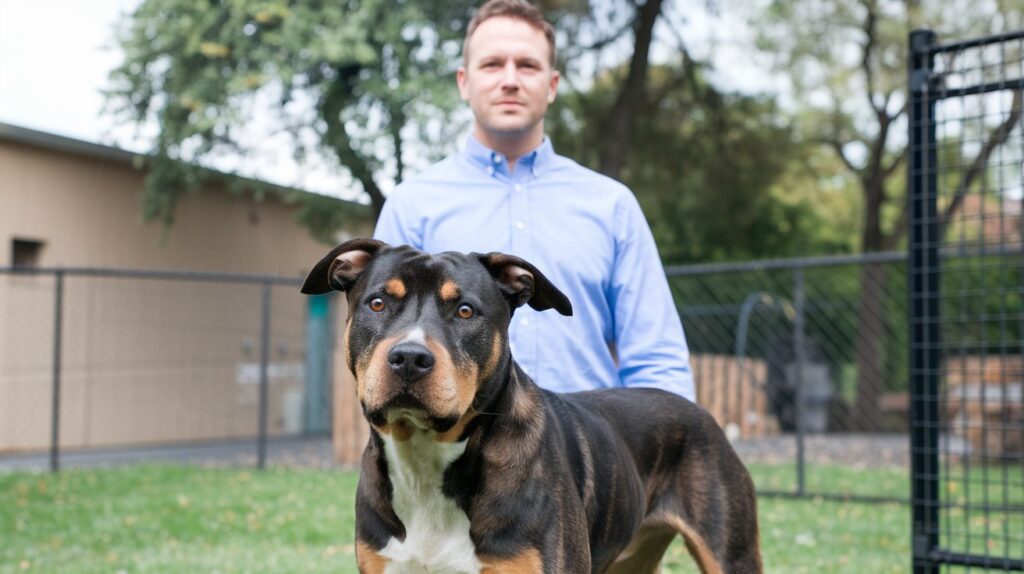
Let’s be honest, these powerful pups aren’t the perfect fit for everyone. They need dedicated owners who can handle their energy, strength, and unique needs.
Pitweiler = Perfect Match IF:
- You’re a Dog Whisperer: You’ve got some dog-owning experience under your belt and know how to be a firm but fair leader. Pitweilers need clear boundaries and consistent guidance.
- You’re an Adventure Seeker: Hiking, running, playing fetch…you name it, you love it! And you’re ready to share those adventures with your energetic Pitweiler.
- You’ve Got the Space: A spacious home with a secure fenced yard is a must for these active pups. They need room to roam and burn off energy.
- You’re a Social Butterfly (for your dog!): You’re committed to socializing your Pitweiler from a young age, introducing them to new people, places, and experiences.
- You’re in It for the Long Haul: You understand that owning a Pitweiler is a lifelong commitment and are prepared to handle the challenges that come with owning a powerful breed.
Pitweiler = Maybe Not a Match IF:
- You’re a Newbie: If you’ve never owned a dog before, a Pitweiler might not be the best starting point. They need experienced owners who can provide consistent training and guidance.
- You’re a City Dweller: Living in a small apartment or a bustling city without access to a yard might not be ideal for a Pitweiler. They need space to exercise and explore.
- You Have Tiny Humans or Furry Friends: While Pitweilers can be great with kids and other pets, supervision is crucial. Their energetic nature and protective instincts might be too much for very young children or small animals.
- You Prefer Couch Cuddles: If you’re looking for a low-energy lapdog, a Pitweiler is not your guy. These pups are always on the go and need plenty of exercise.
- Training Isn’t Your Thing: Pitweilers need consistent training and socialization to thrive. If you’re not willing to put in the time and effort, this might not be the breed for you.
Still not sure? Talk to Pitweiler owners, visit a local shelter or rescue, and do some more research. The most important thing is to find a dog that fits your lifestyle and personality. And if a Pitweiler is your perfect match, get ready for a lifetime of love, loyalty, and adventure!
Finding a Pitweiler: Reputable Breeders and Rescues
If you’ve decided that a Pitweiler is the right breed for you, it’s important to find a responsible breeder or rescue organization.
- Reputable Breeders: Look for breeders who prioritize temperament and health. Ask to see health clearances for the parent dogs and observe the living conditions of the puppies.
- Rescue Organizations: Consider adopting a Pitweiler from a rescue organization. This gives a deserving dog a second chance at a loving home.
A Final Thought:
Whether you’re already a proud Pitweiler parent or just considering adding one to your family, remember that responsible ownership is key. With love, patience, and understanding, you can help your Pitweiler reach their full potential and enjoy a lifetime of happiness together.
Ready to take the leap? Start your Pitweiler adventure today!
FAQs about Pitweilers
Q: Are Pitweilers good with children?
A: With proper training and socialization, Pitweilers can be good with children. However, supervision is crucial, especially with young children.
How much does a Pitweiler cost?
A: The cost of a Pitweiler puppy can vary depending on the breeder and location. Expect to pay anywhere from $500 to $2000.
Are Pitweilers easy to train?
A: Pitweilers are intelligent but can be strong-willed. Consistent training and positive reinforcement are essential for success.
What are the common health problems of Pitweilers?
A: Pitweilers are prone to certain health issues, including hip dysplasia, bloat, and heart conditions. Regular vet checkups and preventative care are important.
Are Pitweilers good guard dogs?
A: Yes, Pitweilers can make excellent guard dogs due to their protective instincts. However, it's important to train them properly to avoid aggression.
Want to learn more about the Rottweiler side of your Pitweiler? Dive deeper into the fascinating world of Rottweilers with our comprehensive guide: 101 Amazing Rottweiler Breed Facts: History, Temperament & Care. You’ll uncover fascinating details about their history, unique temperament traits, and specific care needs. It’s a must-read for any Rottweiler enthusiast!


